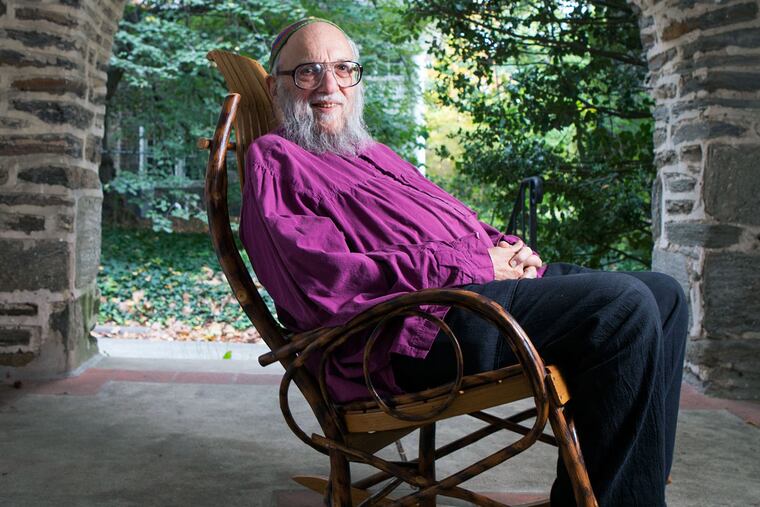Phila. rabbi prepares for bar mitzvah - at age 83
The coming-of-age ceremony left a young Arthur Waskow bored and confused. His bar mitzvah seemed little more than an obligation to memorize and recite a Hebrew reading that the 13-year-old didn't understand.

The coming-of-age ceremony left a young Arthur Waskow bored and confused.
His bar mitzvah seemed little more than an obligation to memorize and recite a Hebrew reading that the 13-year-old didn't understand.
So, after the ceremony, Waskow walked away, relegating his Jewish identity to something to revisit at Passover.
"I just look at it with such sadness," Waskow said of the bar mitzvah he views as a missed opportunity. "Nobody talked to me about the meaning."
On Saturday, 70 years and one religious transformation later, the renowned liberal activist and writer who has inspired - and angered - some of his colleagues in Jewish leadership will step to the lectern for another bar mitzvah, this time as a rabbi at age 83.
Waskow, of Mount Airy, is participating in a not-often-practiced tradition in which the age of 70 counts as one lifetime, and the years lived beyond it are akin to another. At 83 - age 13 in the second lifetime - Waskow has embarked on another stage of maturity and adulthood worthy of a second bar mitzvah, according to the custom.
"He's taking ownership of the tradition that he didn't get to do when he was 13," said Shoshana Waskow, 49, a pediatrician in Chicago and the rabbi's daughter. Rabbi Waskow will read from the Torah about the creation story, the floods, and Noah's Ark. This time, understanding every word.
The ceremony, at Mishkan Shalom synagogue in Roxborough, is also a fund-raiser for the Shalom Center, a nonprofit founded by Waskow in 1983 and of which he is director. About 180 people - including 40 rabbis - are expected to attend the sold-out event.
Based at Waskow's home in Mount Airy, the Shalom Center is a peace and social justice organization that focuses on climate change issues. The group also serves as a perch from which Waskow dashes off his email missives on the topics of the day to a list of more than 11,000 subscribers.
In better than 50 years of activism, he has written 24 books and been arrested 23 times during protests. He spends at least eight hours a day at the computer, reading and writing.
Rabbi David Teutsch, director of the Center for Jewish Ethics at the Reconstructionist Rabbinical College (RRC), describes Waskow as a controversial figure "who has never shied away from speaking the truth as he sees it."
Waskow has been a longtime critic of Israeli policy toward the Palestinians, and his comments have roiled some in the Jewish community, but he also has argued against a blanket boycott of Israel. Waskow favors a two-state solution.
He is forging ahead with new projects, and taking time to reflect after decades of activism and a bout with throat cancer that was diagnosed nearly five years ago.
Waskow and Shalom Center program coordinator Viv Hawkins are organizing neighborhood co-ops to use solar energy, and planning a yearlong observance to mark the 50th anniversaries of the Rev. Dr. Martin Luther King Jr.'s "Beyond Vietnam" antiwar speech delivered on April 4, 1967, in New York City, and the civil rights leader's assassination, which occurred exactly a year later in Memphis.
King's slaying propelled Waskow back to Judaism.
At the time, Waskow was working as a fellow with the Institute for Policy Studies, a liberal think tank in Washington. Riots erupted in the streets, a curfew was instituted, and nearly 14,000 federal troops occupied the district. Walking the streets just a few days before Passover, Waskow had a revelation: Passover's message about freedom from bondage was being lived out in the streets.
"It was like, 'Yes! Yes!' " Waskow said. "It was like discovering a volcano in your background that you never knew existed."
He "awoke to the passionate meaning of Passover and never turned back," he said. Within a year, he had written Freedom Seder, a reimagining of the Passover dinner and rituals that incorporates the liberation struggles of African Americans and others. The contemporary interpretation continues to spawn countless adaptations.
Waskow visited Israel and began teaching at schools including Swarthmore College and the RRC. In 1995, he was ordained into the rabbinate, becoming a leading voice for Jewish Renewal, which seeks to reinvigorate Judaism.
In 2011, Waskow was diagnosed with throat cancer. He was unable to eat, drink, or speak.
"He lost his ability to rouse people to thought and action with his voice," Shoshana Waskow said.
He underwent radiation and chemotherapy. His wife, Rabbi Phyllis Berman, cared for him with the help of neighbors who stopped by daily.
"To live is hard work," Waskow said.
He was declared cancer-free shortly after treatment, and his voice returned after about two months.
The rabbi shows little sign of his illness except for a sometimes cracked and trembling voice, and a famous white beard that is shorter and thinner.
He thinks often about who will carry on the mission of the center, but for now he's happy to continue the work he started decades ago.
"As long as I'm able to do it," Waskow said, "I'll do it."
kholmes@phillynews.com 610-313-8211